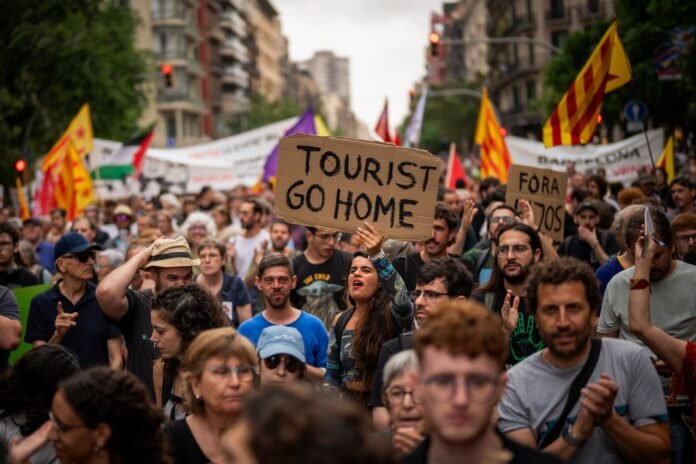In Europe, a whole movement against “overtourism” has taken shape, symbolized by water guns some fed-up Barcelona residents have started brandishing as symbolic weapons against tourists in the Spanish city.
To which I’d say: Let those who are without stamps in their passport squirt the first water gun.
Now, that’s not to say there aren’t serious problems caused by tourism, starting with the environmental impacts of all those extra carbon-spewing airplane trips.
Tourists have also been blamed for degrading cultural institutions, such as by thronging the Louvre to photograph the Mona Lisa. Last week, a painting at the Uffizi Gallery in Florence was damaged by a botched selfie attempt.
Tourists stand accused of wearing inappropriate clothing — or none at all. They litter, drink too much, and make noise. Americans complain that tourists don’t tip; Asians complain that they do. In heavily touristed areas, the crush of visitors can interfere with the rhythms of daily life; how is a busy Parisian supposed to pee on the street in peace with so many tourists gawking at him?
At an extreme, tourism has also been accused of harming indigenous peoples by turning their cultures into commodities, introducing harmful western influences, and making them dependent on the global economy.
Against the backdrop of so many complaints, some localities have started to impose charges in an effort to reduce the number of visitors. Locally, Salem and Vermont have grappled with questions of how, or if, to limit tourism.
Now, I’m certainly not going to defend the small minority of loutish tourists. And when there are actual safety reasons to limit the number of people in a museum gallery or in the canals of Venice, that’s obviously reasonable.
But those are specific problems in specific places, not an indictment of tourism overall.
Indeed, it’s hard not to see some of these high-minded critiques of overtourism as disguised snobbery, prejudice, or horror at the kids these days.
The critiques tend to either implicitly or explicitly suggest there’s a right and wrong way to visit other countries — that it’s fine when enlightened Boomers go to the Louvre to admire its Etruscan antiquities, but horrifyingly gauche when someone else takes a selfie with the Mona Lisa.

Moralizing about the environmental impact of other people’s travel — also known as flight shaming — also strikes me as a losing argument. Who is entitled to judge when someone else’s travel is frivolous? And are you really so sure your “cultural tourism” eco-tourism trip has a lower carbon footprint than the bachelor party in Spain?
The objections also tend to ignore the benefits. Travel does create cultural exchange — and economic activity. In Europe, there’s been a bit of backlash to the backlash, with defenders of tourism pointing out its economic benefits for many workers in those countries. Here in New England, as I wrote about last week, businesses are bracing for losses because of less tourism from Canada.
Tourism is an easy bogeyman. But we all benefit from being able to see the world in ways previous generations could only dream of. Unless you’re willing to give up travel yourself, trying to limit tourism or judge other tourists isn’t the right approach to solving the problems that tourism can create.
This is an excerpt from Are we there yet?, a Globe Opinion newsletter about the future of transportation in the region. Sign up to get it in your inbox early.
Alan Wirzbicki is Globe deputy editor for editorials. He can be reached at alan.wirzbicki@globe.com.






